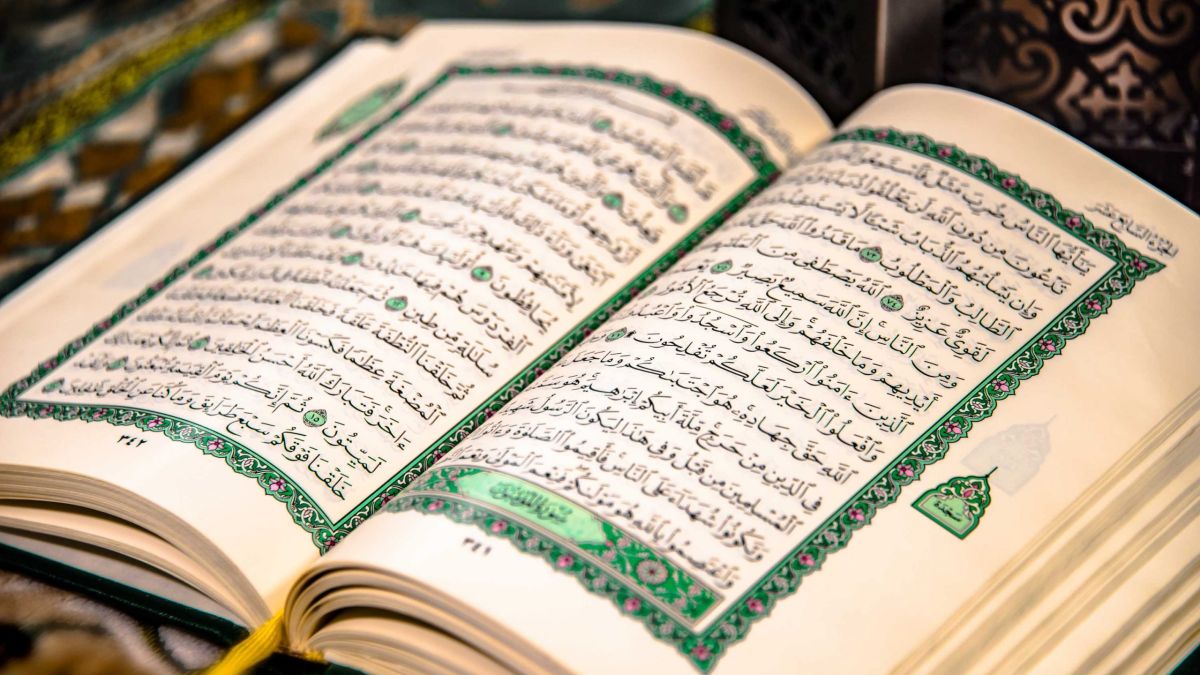May One in a State of Major Impurity Touch or Read the Qurʾān?
Imām Muḥammad ibn Ṣāliḥ al-ʿUthaymīn


The Ruling on Touching or Reading the Qurʾān in a State of Major Impurity
The evidence that the person in a state of major impurity is prohibited from touching or reading the Qurʾān is:
- The ḥadīth of ʿAlī (رضي الله عنه) that the Prophet (صلى الله عليه وسلم) used to teach them the Qurʾān. Nothing would prevent him from the Qurʾān save for janābah [being in a state of major impurity].1
- In preventing one from the Qurʾān while in a state of major impurity, there is an encouragement towards performing ghusl immediately. This is because anyone who knows that he is not allowed to read or touch the Qurʾān in his state of impurity will undoubtedly purify himself as soon as he is able. Thus, there is great goodness in it.
- It has been narrated that the angels quickly seize the words of the Qurʾān as it leaves the mouth of the reciter,2 and that the angels do not enter the house inhabited by a person in a state of major impurity.3 Considering this, if one recites the Qurʾān while in a state of major impurity, he either impedes the ability of the angels to quickly seize the words of the Qurʾān as they leave his mouth, or he harms them with his impure state. We use this as a justification even if there is some weakness in it.
The Ruling on the Menstruating Woman
As for the menstruating woman: she is among those obligated to perform ghusl. Considering this, the majority of scholars hold the opinion that she may not read the Qurʾān while on her menses. Rather, she may remember Allāh with that which is in agreement with the Qurʾān.4
The Opinion of Shaykh al-Islam Ibn Taymiyyah
Shaykh al-Islam Ibn Taymiyyah (رحمه الله) said: There is no authentic, clearly defined evidence to support prevention of menstruating women from reading the Qurʾān. Based on this, she may recite the Qurʾān for the following reasons:
- The original state of any ruling is permissibility until and unless evidence of prohibition is defined.
- Allāh has unconditionally ordered that the Qurʾān be recited. Furthermore, He has praised the one who engages in the recitation of His Book. Thus, whoever wishes to extricate a person from worshipping Allāh through this recitation must bring evidence in support of this claim. If there is no authentic, clear evidence to this effect, then a woman should be ordered with its recitation while on her menses.
[Q]: If it is then said: Could we not give her the same ruling by qiyās (analogy) as the one who is in a state of major impurity, as they both are in a state requiring ghusl due to a substance leaving the body?
[A]: There is a major difference between the two matters being analogised. This is that the one in a state of major impurity may remove that which prevents him from the Qurʾān by simply performing ghusl. While such a removal is not an option for the menstruating woman. Also, the period of menstruation for a woman is mostly prolonged while the one in a state of major impurity usually does not last for a very long period. Rather, he performs ghusl imminently because of ṣalāh.
The period in which a woman bleeds after childbirth is even greater than that of menstruation and therefore even more deserving of permissiveness with regards to the Qurʾān. This opinion taken by Shaykh al-Islām in this matter is quite strong.
If someone was to bring attention to the fact that the scholars have differed in this matter and the aḥadīth regarding it are weak, he may use this to justify the attachment of this ruling to necessity. For example, she may read the Qurʾān at specific times wherein a particular dhikr is legislated, or to practise a part she has just memorised, or to teach young girls in school. In these circumstances, there is a need, so it would be permissible. Otherwise, she should exercise caution and refrain from the Qurʾān while still being able to take part in other forms of dhikr. If someone was to adopt such an opinion, it may also be considered quite strong.
Endnotes:
[1] Authentic: narrated by Aḥmad 1:84, 107, 124, Abū Dāwūd: 229 and al-Tirmidhī: 146 and others. Graded authentic by al-Tirmidhī, Ibn al-Sakan, Ibn Khuzaymah, and al-Baghawī in ‘Sharḥ al-Sunnah.’
[2] Authentic: narrated by al-Bazzār: 603 and al-Bayhaqī 1:38. Graded authentic by al-Mundhirī and al-Haythamī.
[3] Authentic: narrated by Abū Dāwūd: 227, al-Nasāʾī 10:141. This ḥadīth has been corroborated by other narrations and graded authentic by Ibn Ḥibbān and al-Dhahabī.
[4] Translator note: that is, general forms of remembrance like سبحان الله, الحمد لله, etc. although these phrases are present in the Qurʾān.
Source: al-Sharḥ al-Mumtiʿ 1:347-349
Translated by: Riyāḍ al-Kanadī
Most Popular: Last 30 Days

















